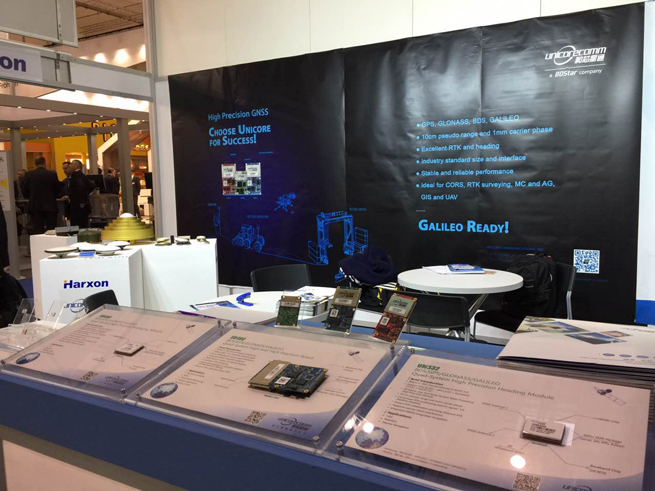The Unicore system was exhibited at the InterGEO 2016 conference
At INTERGEO 2024, Unicore demonstrated its newly designed centimetre-level high-precision GNSS modules, and these innovative products attracted widespread attention in the geospatial community.The UB380, UB282, and UB352 series of high-precision boards have performed particularly well in the overseas market, and have been widely used in the CORS, precision agriculture, unmanned aerial vehicle, and machinery control fields, and have won a good market reputation. It is worth noting that Unicore's high-precision products have fully supported Galileo system, which is an important progress for the European market.
The debut of Unicore's UM332/UM4B0 series of modules is particularly noteworthy, as they utilise a single UC4C0 baseband chip and a single RF chip in a single-sided SMD package, enabling high accuracy heading and output in the industry's smallest size. The modules are capable of tracking multiple satellite systems simultaneously, including BeiDou, GPS, GLONASS and Galileo, providing centimetre-level RTK positioning and baseline bearings better than 0.2 degrees/1 metre. This high-performance module is expected to have a wide range of applications in markets such as UAVs, robotics, marine navigation, GIS, machine control, etc., with the first samples to be available early next year.
The GNSS module market is experiencing significant growth and is expected to grow at a significant CAGR between 2023 and 2030. This growth is attributed to the growing demand for GNSS and GPS modules across the globe, especially in applications such as agriculture, aviation, and automotive. The market report provides in-depth insights on the country-level GNSS and GPS modules market and forecasts cost, segmentation, trends, regional and commercial developments of the key players across the globe.
Moreover, GNSS technology is growing rapidly in Asia Pacific, especially in China, with the completion of the Beidou-3 global satellite navigation system, the application areas of GNSS are expanding to include forest fire prevention, railway inspections, automated terminal operations, smart city projects, and others. The Chinese government and companies are promoting the application of GNSS technology in different fields, including smart cities, precision agriculture, drones, and machinery control.
In Taiwan, the government is also increasing its investment in the space industry, with plans to invest around US$900 million by 2028 to enhance its position in the global GNSS industry value chain. Taiwan's GNSS market is booming, especially with the advent of the 5G era, which is expected to drive the development of new smart services.
Australia and New Zealand are also pushing ahead with the construction of GNSS ground networks, with the goal of expanding the number of stations from 200 to 500 to improve the accuracy and reliability of positioning services. In addition, Australia is expanding the use of digital twin models by adding data layers and improving data platforms.
Overall, the GNSS module market is experiencing rapid technological advancement and market expansion, and new application areas are emerging, providing great business opportunities for related companies. the launch of Unicore's UM332/UM4B0 series of modules signals that high-precision positioning technology will become more popular, further promoting the development and application of geospatial technology.


